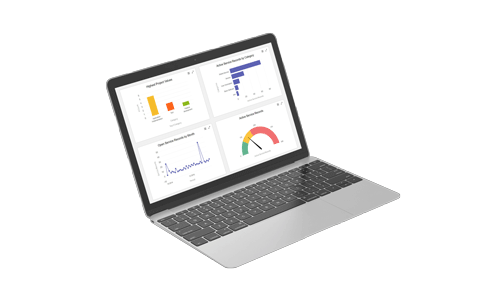“Business diagnosis is the collection and analysis of relevant information from a company to identify the degree of health or efficiency of its systems.”
Through Business Diagnoses, it is possible to look at the company’s internal environment and verify the organization’s strategic alignment with the available resources. It identifies the strengths or vulnerabilities directly affecting the company’s results. Additionally, it makes it possible to analyze the external environment, take advantage of opportunities and use existing resources to tackle adversities and increase its competitiveness in the market.
Thereby, the Business Diagnosis can be compared to a clinical diagnosis requested by a physician. Through specific exams, it is possible to identify possible causes for certain symptoms and suggest appropriate treatments; and in other cases, it may also be used to certify the overall health conditions of participants in competition events.
Application
The focus of the Business Diagnosis can be different for each company and situation. Business diagnoses for production or finance, for instance, will be different from the sales or marketing diagnosis. Although the methodologies and diagnostic tools may be similar, the application of the concepts and the results may be somewhat different.
The Diagnoses carried out by Rumo Negócios® for Mergers & Acquisitions, have a comprehensive scope, with a global approach methodology through which the collection of information from different areas within the company may be used for the preparatory approach for the sale or for organizational improvements.
Most common types
Company’s sale preparation
Before putting a company up for sale, it is essential for the seller to make sure that it is really prepared to face such a challenging process. Often, Companies’ sales are somewhat more complex when comparing with real estate transactions. Whilst the real estate sale process deals with a tangible asset, on companies’ sales processes, we deal with the admission, by investors, of the value of the intangible assets associated. In addition, it is a bureaucratic process that consists of several steps which involve a huge list of documents and relevant clearance certificates to minimize the inherent risks of the transaction.
“In a company sales process, it is essential that the seller is properly prepared to provide conclusive and convincing explanations to the buyer.”
Depending on the nature or amount of resources involved in the deal, it is very likely that the company will undergo Due Diligence before being acquired by the buyer. At Rumo Negócios we have observed an increasing rate in the involvement of consultants specialized in Due Diligence processes, even in small acquisitions. And the reason for that seems quite obvious: it is much more economical for the buyer to invest in specialized consultancy and run preemptive analyses of the prospective business and back off of it if necessary; than it is to acquire it and later realize that it was not quite what it was previously presented..
Organizational performance improvement
As stated before, Business Diagnoses are presented as a clinical diagnosis resulting from mapping down the symptoms that interfere with the company’s growth. Through the process, it is possible to analyze the internal and external environment of the organization, identify vulnerability points affecting results, points to improve, and opportunities that provide for the improvement of market competitiveness. It may also be used to assess the management and whether the generation of revenues and cash flow is adequate to maintain the expected growth, or to pay back ongoing financing.
Benefits
Request a quote
Fill out the form and one of our professionals will contact you.

Do you have any questions?
See the most frequently asked questions about Business Diagnosis. If you have any questions, please contact us, we will be happy to talk to you.
The Business Diagnosis is a kind of exam performed by a specialized professional with adequate tools, and by which possible causes of certain symptoms are identified and the most appropriate treatment is suggested. In other cases, it could also be used to certify the good health conditions of participants at competition events.
Corporate Diagnosis presents itself as an important tool to identify reasons for unsatisfactory performance and to establish the appropriate nexus between cause and effect.
There are several types of business diagnostics and the most common are:
- General Diagnosis
- Accounting Diagnostics;
- Financial Diagnostics;
- Production Diagnostics;
- Marketing Diagnostics;
- Sales Diagnostics;
- HR Diagnostics.
Taking care of your health is as important to prevent diseases, as running regular business diagnoses improves and extends your company’s life cycle.
Yes, it is possible provided the scope of the business diagnosis includes the analysis of the financial part of the company.
Yes, and in such a case, a Business Diagnosis stands as an extremely important solution to identify the cause of the symptom. Lack of profit can be related, for example, to problems with pricing, positioning, or the failure of methods and internal controls with direct impacts on costs and other expenses.
The application of a Business Diagnosis is an opportunity to bring a fresh breath of air into your company’s competencies. The entrepreneur who is often engulfed by operational duties has the opportunity to rely on the experience of off-company professionals with a more dynamic and comprehensive vantage point and who are capable of proposing a series of important improvements for the business development.
Business Diagnostics can be generic or specific in scope. The choice of the best type of diagnosis will depend on the objective of the diagnosis. To illustrate it, a diagnosis whose object is to verify that the company is prepared to start a sales process will have a different scope when compared to a diagnosis to identify possible causes for low profitability symptoms.
Generically speaking, the most common types of diagnoses are General Diagnostics, Accounting Diagnostics, Financial Diagnostics, Production Diagnostics, Marketing Diagnostics, Sales Diagnostics, HR Diagnostics, among others.


